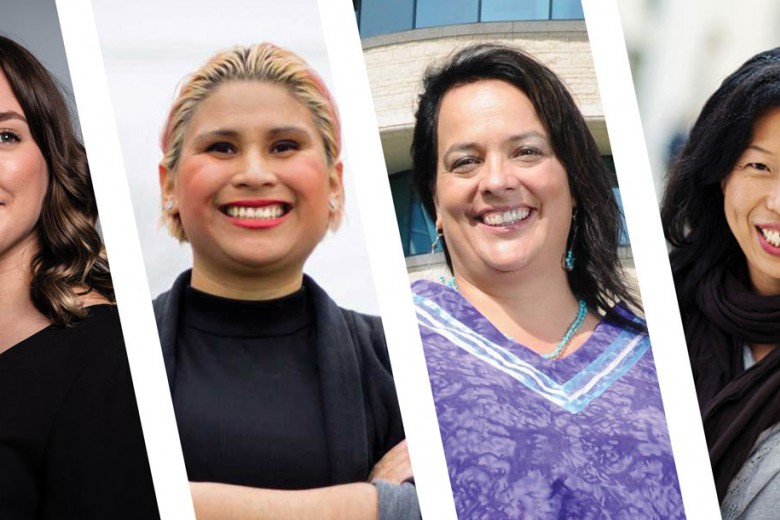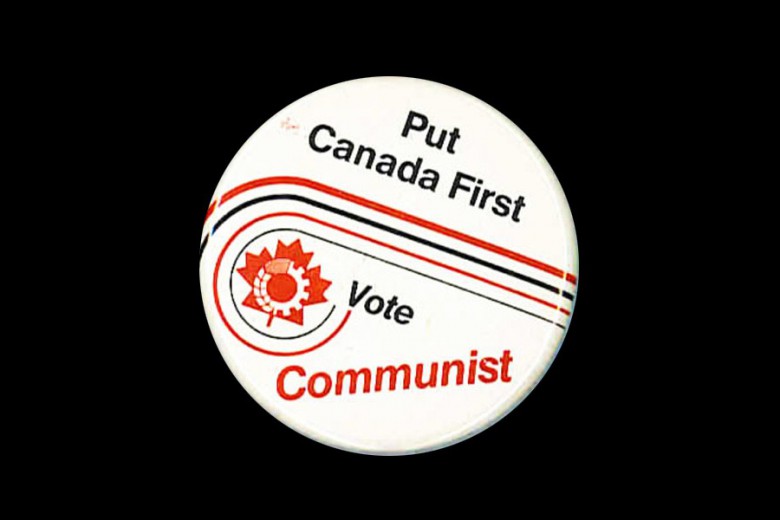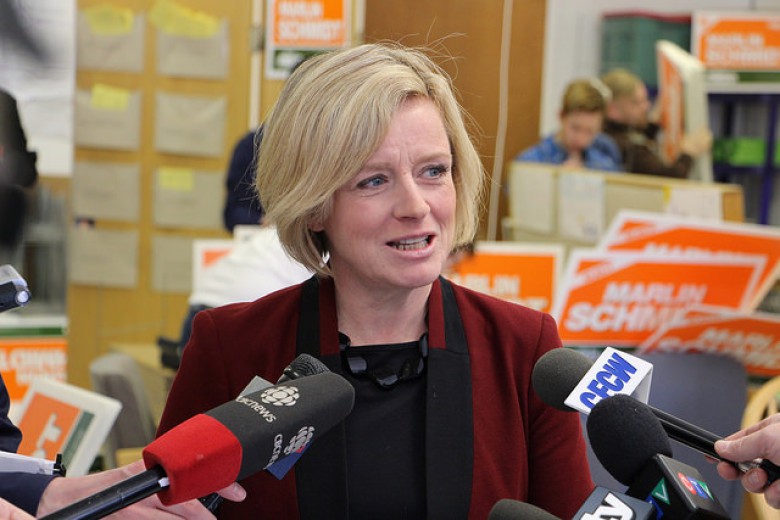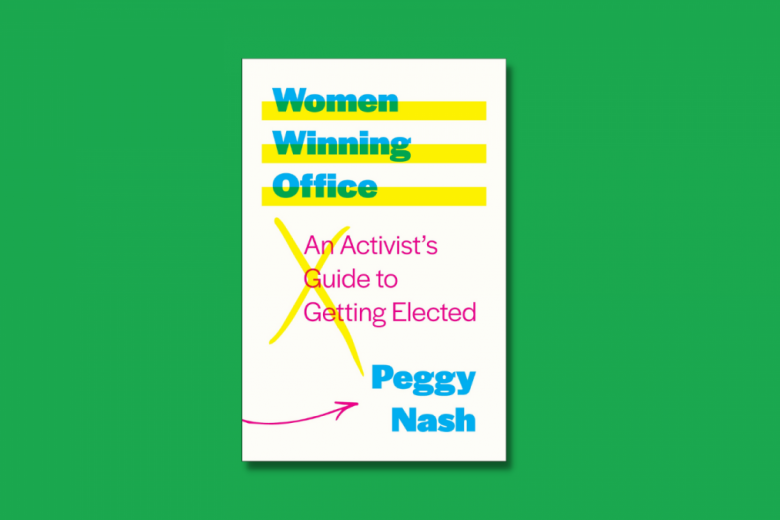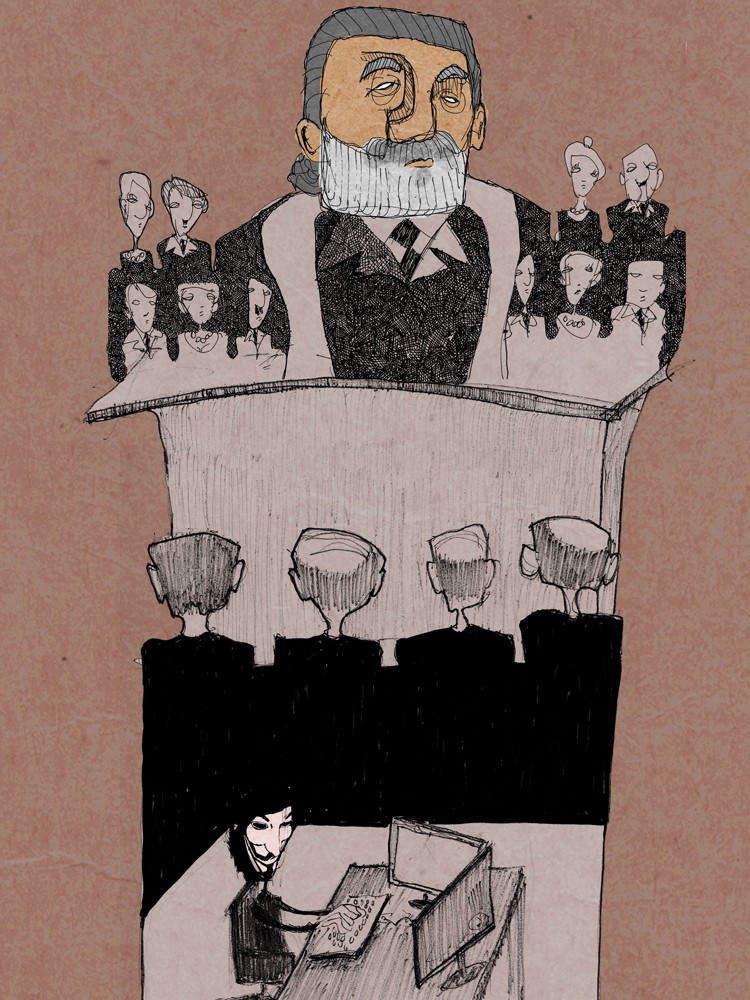
“Political weight,” or lack thereof, is a common topic of discussion among Muslims in Canada these days. Extending outside the realm of off-the-record, private chatter, the issue has become a serious public concern for Muslims after almost a decade of Conservative Party rule in Canada.
Debates ranging from political issues, like surveillance and security, to social ones, such as the permissibility or legality of the Muslim face veil (niqab), have placed the spotlight on Muslims in Canada. Yet it’s precisely this kind of attention that has prompted Muslims to realize just how little leverage they have. The post-9/11 climate has twisted the public sphere, limiting the ability of Muslims to influence the public perception of their own communities, culture, and faith.
This reality has become ever more acute in Stephen Harper’s Canada, where extreme security legislation such as Bill C-51 (the Anti-terrorism Act), among other laws, has been pushed through Parliament on a wave of rhetoric focused on what Harper calls “the international jihadist movement.” References to Muslims as a threat inside and outside of Canada have become ubiquitous. Though the policies and language that challenge Muslims’ place in Canada tend to treat Muslims as a singular entity, the pluralism of Muslim communities themselves may fragment the response to government rhetoric.
In the past year we’ve seen several initiatives arise within Muslim communities to address the political and social targeting of Muslims in Harper’s Canada. These efforts reflect the dynamism of Muslim communities, as many transition to second-generation immigrant communities with Canadian-born youth who are increasingly vocal.
A rising generation
Raja Khouri is president and co-founder of the Canadian Arab Institute and a commissioner with the Ontario Human Rights Commission. He co-founded the Canadian Arab Institute in 2011 with a group of Arab-Canadian leaders and was instrumental in organizing the group’s official launch two years ago at the Royal Ontario Museum. He calls the institute a “think-and-do tank” that focuses on civic engagement and the expansion of Arab and Muslim influence in Canada.
“The level of political organizing we see within the Muslim community now is in many ways unprecedented,” he says, “and a new generation of Muslims are invested in the political process.”
This is a common view among many Muslims in the Greater Toronto Area (GTA), which, with over 420,000 Muslims has by far the largest Muslim population of any Canadian city. According to the 2011 National Household Survey conducted by Statistics Canada, Muslims now constitute 3.2 per cent of the national population, up from two per cent in 2001. Islam is one of the fastest-growing religions in Canada, but the demographic rise hasn’t been accompanied by increased social and political clout. Muslim voter turnout has tended to be low in Canada, and political activism has often been disparate if not muted.
For some activists, low voter turnout is a concern. Consecutive Canadian censuses show that the Muslim community in Canada grew exponentially after 1970, with the population ballooning from around 33,000 in 1971 to over 570,000 by 2001. Many say that older Muslims don’t feel as much connection to Canadian issues as they do to problems “back home.” Meanwhile, the very idea of being able to collapse all Muslims together as a demographic bloc, despite the nearly limitless diversity of the Muslim world culturally, historically, and geographically, should give us pause.
Still, in the post-9/11 world, people like Khouri have had to work to counter racist and Islamophobic attitudes that target all Muslims. Over the last 14 years, Muslims across Canada have become more focused on shaping their own narratives of who they are, and electoral engagement is part of that process. Khouri says that in the lead up to the 2015 federal election, the Canadian Arab Institute is partnering with a number of groups in Alberta, Quebec, and elsewhere to promote political participation within Muslim communities. While Ontario has the largest Muslim population, centred in Greater Toronto, the Muslim populations in Montreal, Edmonton, Calgary, and parts of B.C. are substantial.
The idea is to pull these constituencies out to vote by referring to key issues that affect many Muslims. According to a 2011 Ipsos Reid exit poll, 46 per cent of Muslim voters chose the Liberal Party, while 38 per cent voted for the New Democrats. Harper’s Conservatives received just 12 per cent of the Muslim vote. And while the Liberals have crafted a reputation as the party of Canadian multiculturalism, Justin Trudeau’s support for Bill C-51 has angered many in the Muslim community, especially younger people, who may look further left on the political spectrum.
Indeed, there is little doubt that the generational shift within Muslim communities will have political consequences. Over the years, Khouri has witnessed significant changes in the nature of Muslim organizing in Canada. Whereas the older generation of Muslim immigrants was, according to Khouri, more insular and reserved about the organizing they did, the youth are more outward looking and outspoken.
“A younger generation, many of them professionals, see themselves as only Canadian, and their connection to Canada is visceral, compared to that of their parents,” Khouri says. “They speak on issues as Canadians, they know how the system works, and are taking advantage of it.”
This generational difference has caused tension within Muslim communities. The youth are hungry for a space where they can address everyday problems, and some find the mosque networks inadequate. Mosques in Canada are mostly run by the older generation who founded them. Engaging with the media or the political class is of far less importance for them than, say, keeping the mosque moneyed enough to last another generation. Many of these mosques also have charitable status, which, in Stephen Harper’s Canada, can easily be revoked if administrators aren’t careful. There are structural incentives for keeping a low profile. “Mosques serve as a system of support for countless Muslim refugees and immigrants and also offer a wide range of assistance for lower-income Muslim families,” notes Eman Bare, a Toronto-based journalist and activist who is Muslim.
Today there are efforts to go beyond the traditional, politically quiescent mosque network by creating new platforms. Many in the older generation have immigrated from countries with closed and oppressive political systems, where engaging in political organizing can mean risking one’s personal safety. For many younger Muslims, such fears and experiences are more distant. Muslim students are increasingly raising their voices on campuses and drawing attention to issues such as Canada’s support of apartheid Israel and other oppressive Middle East regimes.
Meanwhile, on social media like Twitter, Harper’s failed attempt to bar Muslim women from wearing the niqab while taking the citizenship oath was met with a campaign of derision and sarcasm, using the hashtag #DressCodePM.
Project Civic Engagement
One effort to break from the status quo is the GTA-based initiative called Project Civic Engagement (PCE), which focuses on political literacy and mobilization within Muslim communities. The group officially launched at the Central Library in Mississauga, Ontario this past June by pulling together a panel of four experts who spoke of the effects of Islamophobia on Canadian politics. The event was sponsored by the Toronto and York Region Labour Council, and co-hosted by one of its staffers, Mohammed Hashim, a driving force behind PCE.
Islamophobia has had “a chilling effect” on the Muslim community in Canada, Hashim says. “The whole point is to break out of this because it’s paralyzing.” Hashim and others point directly to the rhetoric of the Harper government as the impetus for their involvement. Harper has, on occasion, implied that Muslims come from backward cultures that are, among other things, “anti-women,” and Hashim sees such language as directly challenging Muslims’ place in Canadian society.
For years, Hashim had pondered the question of how to harness the political potential of Muslims in Canada. Last fall he decided to approach an organization called DawaNet, also headquartered in Mississauga, which was organizing a municipal debate leading up to the GTA city election. Hashim got in touch with leading DawaNet coordinator and board member Taha Ghayyur. Soon Project Civic Engagement was born as a DawaNet initiative, which means PCE has access to DawaNet’s huge email listserv of Muslims across Canada.
Ghayyur admits that he doesn’t have an extensive background in political engagement, but, like much of the Muslim community itself, is happy that a process of civic organizing is taking place. “Once things get started, I find that it’s actually not too hard to get people involved and interested,” Ghayyur says. “Once people see results, they become more curious, and the challenge then is to maintain that level of engagement.”
Beyond Harper
Having lived most of his life among the GTA’s Muslim community, 35-year-old Ghayyur attributes the recent surge in political activity only partially to the Harper administration’s language and policies.
“The other trigger, to be honest with you, is the sex-ed issue here in Ontario,” he notes, referring to the Ontario government’s decision to update the province’s sexual education curriculum. The new program has become a lightning rod of sorts for a section of Ontario’s Muslims, many of whom are vehemently opposed to Premier Kathleen Wynne’s decision to deliver the curriculum to younger students.
“There’s just so much activity in that area right now,” Ghayyur says. “It’s tough to find another issue that that has gotten so many Muslims interested in policy – on any level.”
More conservative segments of the Muslim community have taken to the streets to protest the curriculum, a stark contrast with the engagement that is in opposition to the federal Conservatives. The sex-ed issue, it seems, has proven more visceral for some Muslims than Harper’s attacks on Muslim women who wear the niqab or the Conservative’s security legislation. Both Ghayyur and Hashim agree that there is a highly conservative strain within Muslim communities that tends to make a caricature out of the very idea of sexual education for children.
This hyper-conservatism that has been so visible in opposition to the sex-ed curriculum has the potential to disrupt what’s actually driving the relatively recent process of Muslim political engagement in Canada. But as with any large faith group rooted in diverse histories, traditions, class backgrounds, and trajectories, there is not necessarily one political direction that the majority of Muslims will take.
Some Muslim civic engagement groups have decided to steer clear of specific issues and partisanship altogether, staying rooted in get-out-the-vote campaigns. This is the case for Canadian-Muslim Vote (CMV). The non-partisan group launched last year, and has become one of the more visible Muslim organizations focusing on political literacy in the community.
“The non-partisan approach was very important for me,” says Muneeza Sheikh, a lawyer, community organizer, and mom who now serves as one of CMV’s spokespeople. “It’s about educating Muslims about their political potential, not about pushing a particular political agenda.” Sheikh points out that she was primarily attracted to the group’s ability to balance what she sees as an Islamic identity with the implications of being a citizen.
“My cultural identity is just as important as my religious one,” she says, echoing what seems to be a growing sentiment among younger Muslim professionals. “And, for me, my cultural upbringing is basically Canadian.”
Muslims like Sheikh are emblematic of a younger professional class, raised primarily in Canada, which is looking to project its voice into the public. The question remains, though, as to how such a voice will choose to orient itself politically. The generational and socio-political tensions have already become apparent, despite the tendency to treat Muslims as a cohesive voting bloc by those who recognize that the Muslim population will grow substantially in coming decades.
For politicians looking to get elected, Muslim communities are a largely untapped well of potential voters. Groups like Project Civic Engagement and Canadian-Muslim Vote are aware of this, and are asking Canadian Muslims to take advantage of the opportunity to have their needs addressed. Whether this interest in electoral engagement will outlast the October election, or how fruitful any of it will be, is an open question.
Bare says, “when it comes to the political culture in Canada, one has to ask, is there a political party that does not further marginalize Muslims? Considering that the Liberals support Bill C-51 and that all three major parties including the NDP effectively supported Israel during its deadly war on occupied Gaza last summer, it would be difficult to argue yes.”
If the Harper Conservatives are voted out, things will become more interesting, as Muslims in Canada will have lost their primary political opponent.


